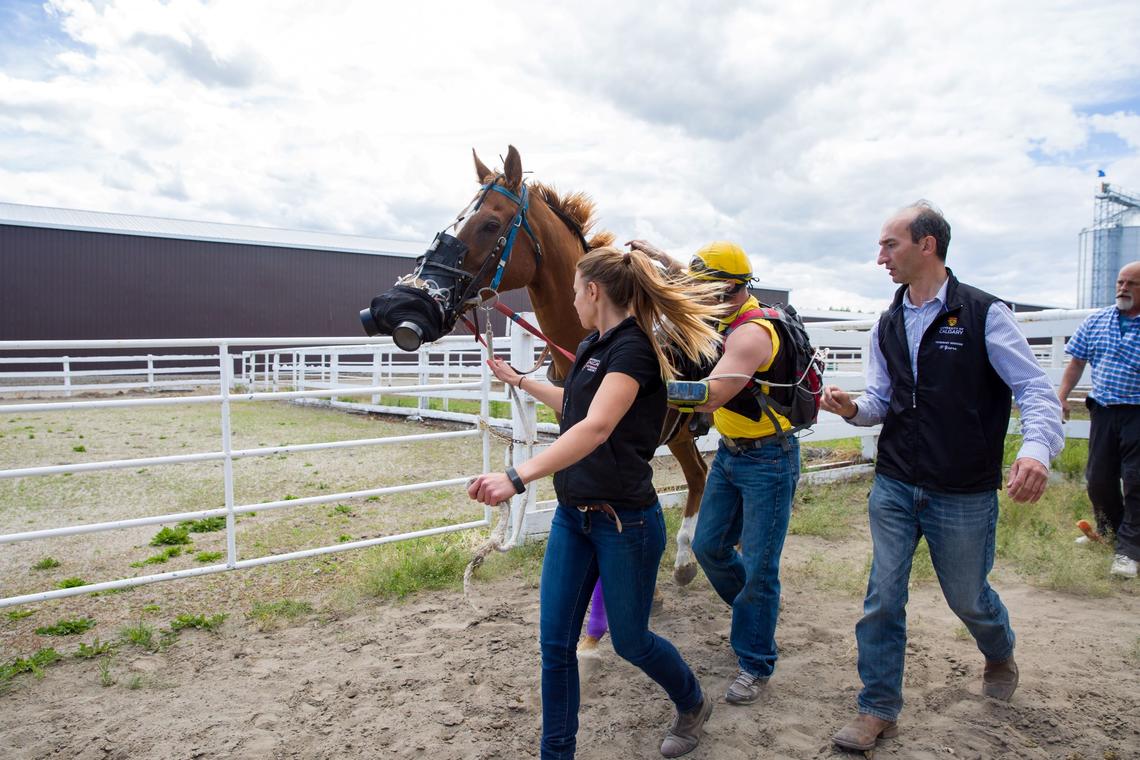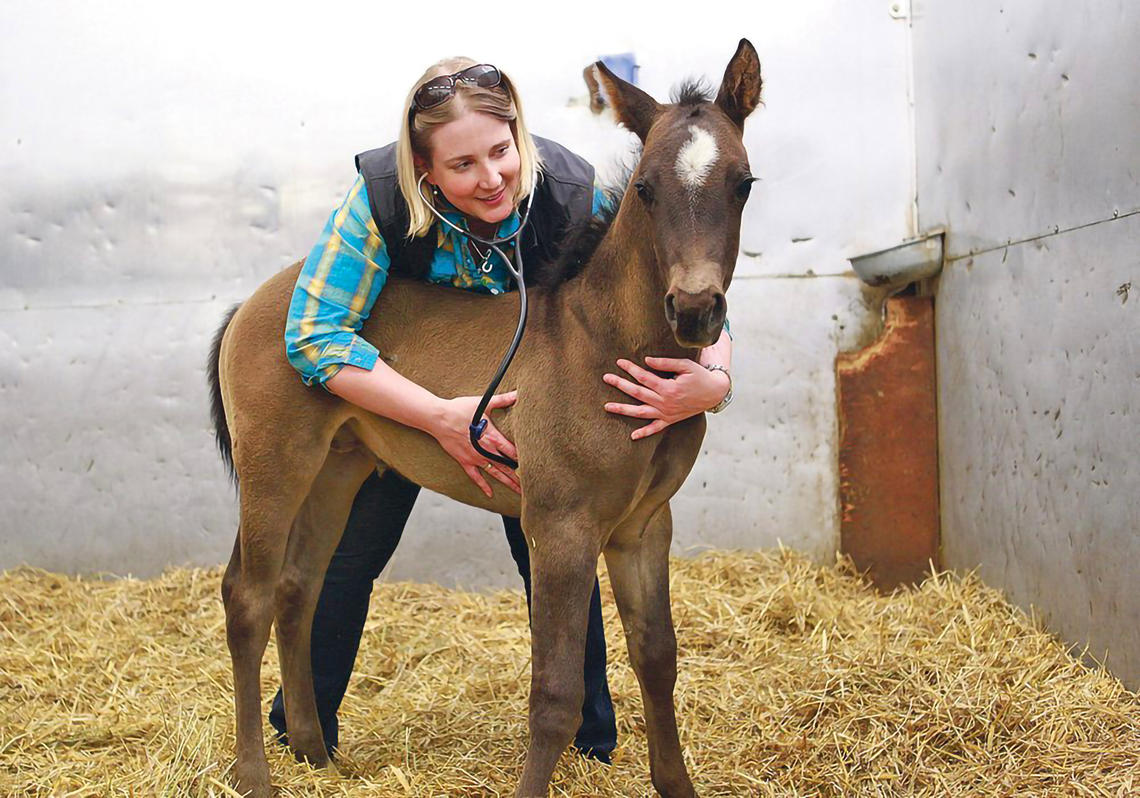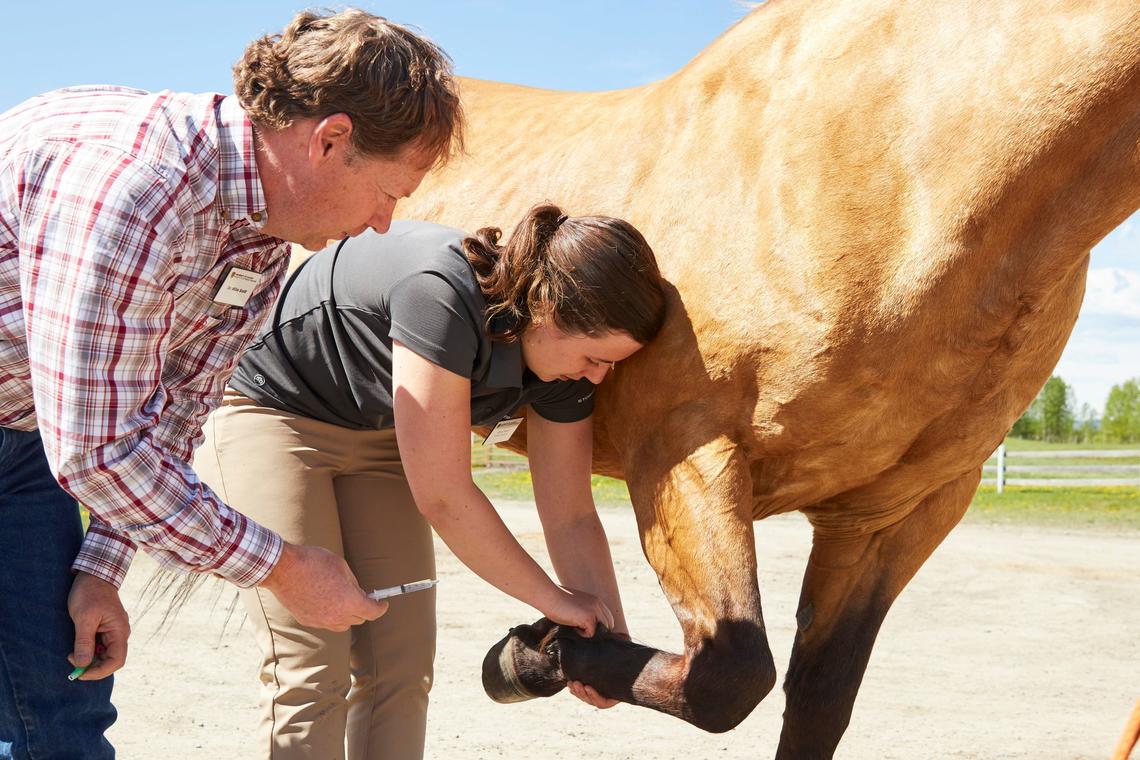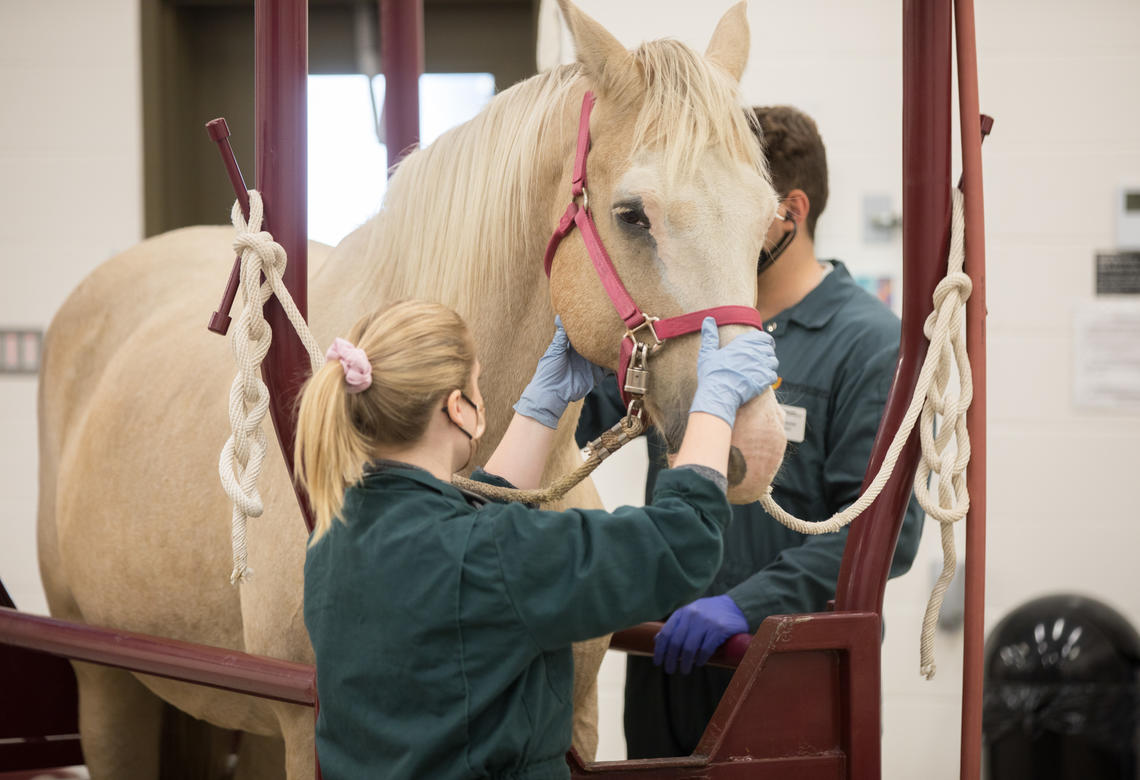Dec. 20, 2021
Galloping toward health: Equine expertise helps all horses, from pony clubbers to Olympic-level jumpers
Lameness, colic, asthma, dental problems, and umpteen infectious diseases; the list of health issues that can threaten the well-being of a horse is seemingly endless.
These and other horse health challenges are being addressed by equine health experts at the University of Calgary Faculty of Veterinary Medicine (UCVM).
“It’s very important for the horse community to be at the cutting edge of research so it has direct access to new discoveries to better take care of horses and improve their health,” says Dr. Renaud Léguillette, DVM, PhD, professor of equine internal medicine and Calgary Chair in Equine Sports Medicine.

Renaud Léguillette conducts research measuring VO2Max - the maximum volume of oxygen a horse uses during exercise.
Riley Brandt, University of Calgary
Léguillette is one of a growing team of horse health clinicians and researchers helping propel UCVM to become a leader in equine health. He has developed a research program on inflammatory lung diseases and cardio-respiratory exercise physiology. Léguillette collects data in the field on sports horses from the community in Alberta and from international collaborations, with his findings benefiting horses across a wide range of disciplines.
Another member of UCVM’s team of equine experts is Dr. Holly Sparks, DVM, PhD, a large animal surgeon, stem cell biologist, and assistant professor. Her multidisciplinary research in regenerative medicine and stem cell biology is advancing knowledge about healing severe wounds and burns in both horses and people.
Dr. Ashley Whitehead, DVM, associate dean of clinical programs at UCVM, conducts clinical research in areas including equine infectious diseases, gastrointestinal conditions, and neonatal foal intensive care. This year, she started a project on Potomac horse fever (PHF) — an infectious disease caused when horses ingest hay, grain, or drinking water contaminated with bacteria carried by aquatic insects.
Whitehead has collected blood samples from healthy horses across Alberta, investigating the seroprevalence of PHF. The aim is to provide more information for veterinarians and owners to make informed decisions on diagnosis, treatment, and biosecurity measures to prevent and control the disease.

Ashley Whitehead conducts clinical research in areas including equine infectious diseases, gastrointestinal conditions, and neonatal foal intensive care.
Jager & Kokemor
Program also prepares future equine vets and engages with local communities
Along with the innovative work of researchers Léguillette, Sparks, Whitehead, and others, UCVM’s Equine Health Program also includes world-class clinical care, training the next generation of equine veterinary specialists, supporting equine internships, residencies, and clinical fellowships, and providing horse health care in partnership with local Indigenous communities.
The latter initiative was spearheaded in 2018 by Dr. Jean-Yin Tan, DVM, a senior instructor in equine clinical sciences at UCVM. She set up horse health clinics in partnership with the Tsuut'ina and Siksika Nations. Originally designed by Tan as a clinical skills lab providing horses with physical exams, vaccines, and deworming, the program expanded into two-week student rotations that included preventive care, including dentistry and lameness assessment.
Developing an equine program of this calibre is an ambitious endeavour. UCVM’s clinical expertise, its partners in the Distributed Veterinary Learning Community, and philanthropy all play a role in building this world-class program.
Community support adds horsepower to equine health research
A biotech project on lameness being led by Dr. Mike Scott, DVM, an equine surgeon and associate professor at UCVM, was kick-started by support from two horse owners. Scott has been conducting lameness exams for 25 years, that condition being the most common clinical problem encountered by veterinarians and that virtually every horse owner has experienced.

Mike Scott oversees a student conducting a lameness exam on a horse during a 4th-year horse health rotation at Tsuut'ina Nation.
Todd Korol, for the Faculty of Veterinary Medicine
“I know how frustrating it is for horse owners and I wanted to find a better way,” Scott says. That better way is what he’s been working on for the last few years. “I’ve been developing a gait analysis system for use on horses that employs an instrumented horseshoe with a tiny sensor that can measure ground reaction force, how much weight a horse is putting on a given foot,” he explains.
The idea so intrigued two of his horse-owning clients, Pam Janzen and Graham Bruce, that they provided generous funding to get the project underway.
“As the owners of horses, we greatly appreciate our ability to access the most up-to-date veterinary care, and thus we feel it's important to support such advancements,” says Janzen. “We were presented with a very interesting equine research proposal at the U of C and have felt like true partners in the project as it progresses.”
Scott’s aim is to perfect a lightweight, wearable, reliable horseshoe device that measures the force under all four feet of the horse when it’s doing natural movement in its natural environment. While it’s still in the prototype stage, “I think we're well on our way to having a functional system,” says Scott.
'Valuable and visionary' research and education
A recent contribution from Boehringer Ingelheim Animal Health Canada Inc. will support a variety of horse-health- related activities at UCVM — including equine education, clinical activities, and research efforts.

Students examine a horse during an equine clinical skills lab.
Faculty of Veterinary Medicine
“Our ambition is to find new and better ways of improving the health and well-being of horses and we feel, by supporting UCVM’s Equine Health Fund, we will be helping the exceptional work that UCVM is doing which supports the equine community across Canada,” says Randy Trumpler, equine business unit director, Boehringer Ingelheim Animal Health Canada Inc.
Dr. Renate Weller, dean of UCVM, sees generous donations like this one “as a signal to others in the community that the research we are doing and the education we offer is valuable and visionary — for veterinarians, allied professions, and society more broadly.”
Established in 2005, UCVM has carved a reputation as a place for innovative veterinary education and research and ranks in the top 40 veterinary programs worldwide and second nationally. Our goal is to be Canada’s leader in equine health, providing the community with world-class clinical knowledge, excellence in training the next generation of equine veterinary specialists, and innovative research to benefit the health of all horses. To find out more about how you can contribute to advancing equine health at UCVM please visit our website.





